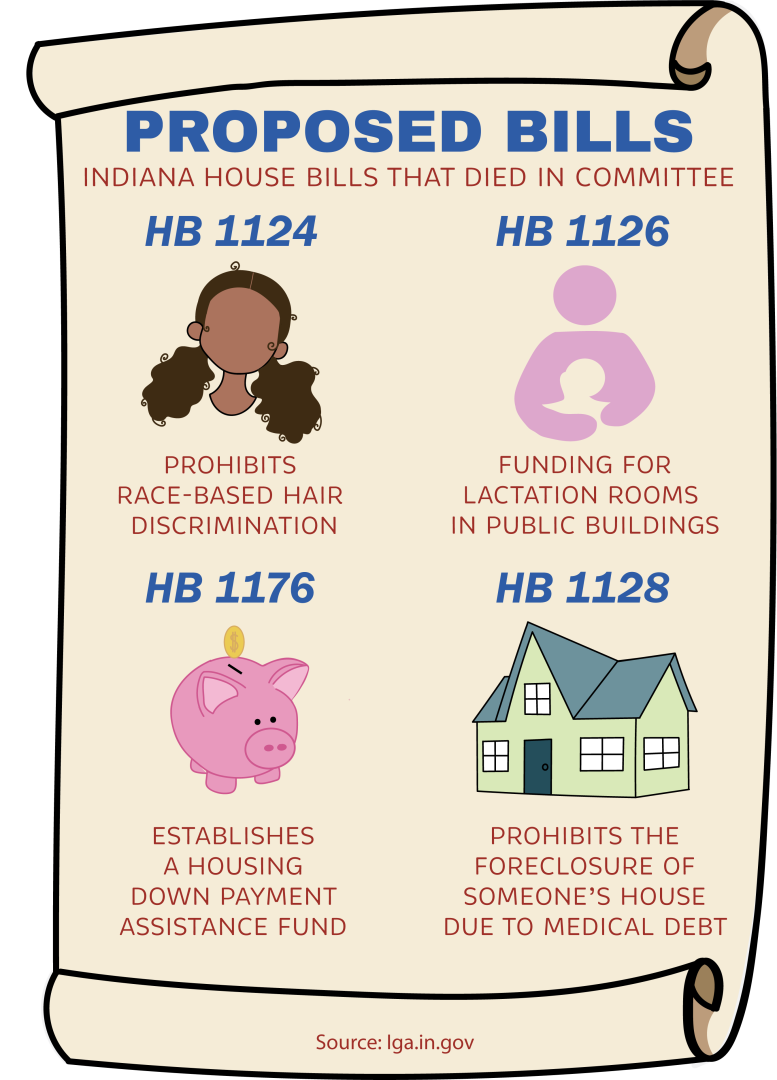A number of bills brought to the Indiana General Assembly died on Jan. 29 after their first reading in committee. Among them were bills addressing issues such as race-based hair discrimination and a lack of affordable housing in Indiana. House Bills 1124, 1126 and 1128 were proposed by Democratic Rep. Vanessa Summers. HB 1131 was proposed by Democratic Rep. Mitch Gore, and HB 1176 by Democratic Rep. Earl Harris. According to Assistant Professor of Philosophy Lacey Davidson, the bills are considered dead because no action was taken after their first readings in committee. The committees that read the bills were the education, judiciary, ways and means, commerce, small business and economic development committees.
HB 1124 was proposed to prohibit discrimination based on traits historically associated with race, such as hair texture and protective hairstyles. Assistant Professor of Sociology Colleen Wynn explained that similar legislation has been brought up in committees before and that this bill was not the first of its kind.
“We have some more protections already in place, but it [HB 1124] would prohibit race-based discrimination or discrimination based on hair texture in school,” Wynn said. “So this would sort of be a version of the CROWN act.”
The CROWN Act, which stands for Creating a Respectful and Open World for Natural Hair, was created in California in 2019 to ensure protection against discrimination based on race-based hairstyles and protective styles such as braids, locs, twists and knots in the workplace and public schools, according to CROWN Act Coalition. Wynn said many other states have a version of the CROWN act in effect, and that HB 1124 would have been Indiana’s version of it.
“Other states already have a version of a CROWN act in place, either that specific bill or legislation kind of embodying that,” Wynn said. “So, this [HB 1124] would be a version of that in Indiana here, which would be great, right? We would be joining many of our other peers in offering those protections for people. We know that racial discrimination is real, [that] this is a form of discriminating against people because of their hair texture [and] would be a form of racial discrimination. … This [HB 1124] would allow specifically kids in school to have these kinds of important cultural hairstyles.”

HB 1176 addresses investor ownership of single family residences. The bill establishes a housing down payment assistance fund and a tax of 50% of the fair market value of a single family residence for each single family residence acquired by an applicable taxpayer, according to the IGA 2024 Session. According to Investopedia, fair market value is the price an asset would sell for on the open market when certain conditions are met. These conditions are that all parties involved in the purchaase are aware of all the facts, acting in their own interest, are free of any pressure to buy or sell and have ample time to make the decision.
According to Wynn, many properties in Indianapolis are bought up by investors who will raise the price above fair market value. This lowers the number of available, affordable residences in Indianapolis.
“This bill is attempting to address the issue that many homes in Indianapolis are owned as kind of investor properties, and some even by people out of state. … And so that creates a lot of issues for people who live here, because their landlords aren’t here and easily accessible to address any issues that come up, but also they might be charging high rents,” Wynn said. “This means if you’re an investor, and you can buy up those homes … people who are trying to buy a house—maybe especially first-time homebuyers or something, or low-income homebuyers—might not be able to compete and offer as much money.”
According to the National Low Income Housing Coalition, in 2023 there were 39 available and affordable rental homes in Indiana per 100 extremely low income households. This leaves 70% of extremely low income renter households with severe cost burden, according to the website.
“[HB 1176] is trying to prevent a lot of individual investors from buying multiple homes in Indiana, as well as establishing a housing down payment assistance fund to help people [afford] money for the mortgage every month,” Wynn said. “But for so many people, the down payment is such a big barrier. So you have to save up quite a lot of money, and so this would establish a fund to be able to provide some assistance.”
Associate Professor of Political Science Laura Merrifield Wilson said that HB 1176 may not have been passed because this is a non-budgeting year. Representatives are not likely to vote for a bill that would spend a lot of money when they are preparing for re-election, she said.
“Money was given out last year, or it was allocated and appropriated, and it will be given out next year,” Merrifield Wilson said. “So you have to make hard decisions and budget like someone’s going to get money and someone’s not. You never have enough money forever. So we separated out, and we ran a two-year budget. And they already had to figure out where to spend their money, and they’ll wait until next year when another budget passes.”
Davidson said she believes it is important for everyone to be a part of legislation. She said citizens need to educate themselves on important issues in the state.
“Anyone can testify in a committee hearing. You can always sign up to testify,” Davidson said. “In the committee is often the best time for a citizen to go and say whether they’re in support and why, or whether they oppose and why. And then of course, you can always call. So if you really oppose or support a bill, you can call the person who cares most about your opinion … the person who represents you, your representative.”







